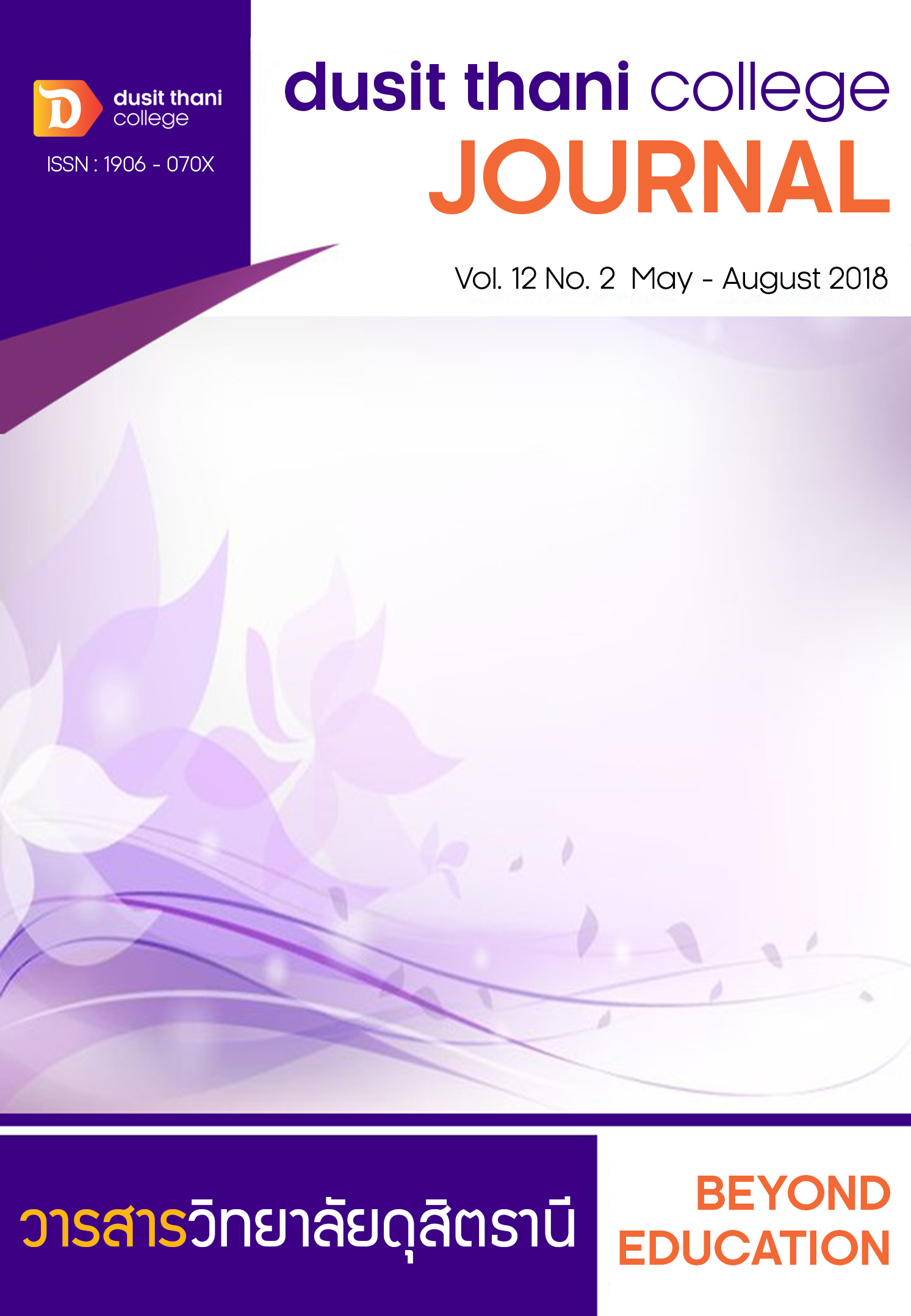การพัฒนาแนวทางการส่งเสริมความทุ่มเทมีใจของพนักงานเพื่อความเป็นองค์กรนวัตกรรม ในอุตสาหกรรมโรงแรม
Main Article Content
บทคัดย่อ
การศึกษา ในครั้งนี้เป็นผสมผสานของทฤษฎี 2 ทฤษฎี คือ ทฤษฎีการทุ่มเทด้วยใจในการทำงานและทฤษฎีองค์กรนวัตกรรม ทฤษฎีความทุ่มเทมีใจในการทำงาน หมายถึง การให้ความสำคัญกับการรักษาพนักงานไว้กับองค์กร และการส่งเสริมให้มีการทำงานด้วยความสุข และการมีทัศนคติที่ดีต่อองค์กรซึ่งจะช่วยให้พนักงานเกิดความรู้สึกอยากทำงานอย่างเต็มความสามารถจนเกิดประโยชน์สูงสูดแก่องค์กร และทฤษฎีองค์กรนวัตกรรมหมายถึงองค์กรที่มีความสามารถในการสร้างสรรค์นวัตกรรมใหม่ให้เกิดขึ้น ด้วยระบบการจัดการ ทรัพยากรที่มีอยู่เพื่อสนับสนุนให้เกิดนวัตกรรมใหม่ ๆ อันจะนำมาซึ่งการสร้างคุณค่า ผลกำไรและจุดแข็งที่ต่างจากองค์กรอื่น ๆ
การศึกษานี้ได้นำเสนอองค์ความรู้ใหม่ที่เกี่ยวกับการเชื่อมโยงที่สำคัญของทั้งสองทฤษฎีคือทฤษฎีความทุ่มเทมีใจในการทำงานและทฤษฎีองค์กรนวัตกรรมในอุตสาหกรรมโรงแรมของประเทศไทย รวมถึงการเสนอแนะแนวทางการส่งเสริมความทุ่มเทมีใจของพนักงานเพื่อความเป็นองค์กรนวัตกรรมในอุตสาหกรรมโรงแรมของไทย
Article Details
นโยบายการพิจารณากลั่นกรองบทความ
- บทความวิจัยและบทความวิชาการทุกเรื่องที่จะได้รับการตีพิมพ์ต้องผ่านการพิจารณากลั่นกรองโดยผู้ทรงคุณวุฒิ (Peer Review) ในสาขาที่เกี่ยวข้อง จำนวน 3 ท่าน/บทความ
- บทความ ข้อความ ภาพประกอบและตารางประกอบที่ลงตีพิมพ์ในวารสารเป็นความคิดเห็นส่วนตัวของผู้เขียน กองบรรณาธิการไม่จำเป็นต้องเห็นด้วยเสมอไป และไม่มีส่วนรับผิดชอบใด ๆ ถือเป็นความรับผิดชอบของผู้เขียนแต่เพียงผู้เดียว
- บทความที่จะได้รับการตีพิมพ์จะต้องไม่เคยตีพิมพ์ เผยแพร่ที่ใดมาก่อน และไม่อยู่ระหว่างการพิจารณาของวารสารฉบับอื่น หากตรวจสอบพบว่ามีการตีพิมพ์ซ้ำซ้อน ถือเป็นความรับผิดชอบของผู้เขียนแต่เพียงผู้เดียว
- บทความใดที่ผู้อ่านเห็นว่าได้มีการลอกเลียนหรือแอบอ้างโดยปราศจากการอ้างอิง หรือทำให้เข้าใจผิดว่าเป็นผลงานของผู้เขียน กรุณาแจ้งให้กองบรรณาธิการวารสารทราบจะเป็นพระคุณยิ่ง
เอกสารอ้างอิง
Albrecht, S. L. (2012). The Influence of job, team and organizational level resource on employee well-being, engagment, commitment and extrarole performance: test of a model. International Journal of Manpower, 33(7), 840 - 853.
Andrew, O. C., & Sofian, S. (2012). Individual Factors and Work Outcomes of Employee Engagement. Procedia-Social and Behavioral Sciences, 40, 498 - 508.
Henttonen, K., Ritala, P., & Jauhiainen, T. (2011). Exploring open seach strtegies and their perceive impact on innovation performance-empirical evidence. International Journal of Innovation Management, 15(3), 525 - 541.
Karatepe, O. M. (2012). High-performance work practices and hotel employee performance : The mediation of work engagement. International Journal of Hospitality Management.
Menguc, B., Auh, S., Fisher, M., & Haddad, A. (2012). To be engaged or not to be engaged : The antecedents and consequences of service employee engagement. Journal of Business Research.
Nilsson, S., & Ritzén, S. (2014). Exploring the Use of Innovation Performance Measurement to Build Innovation Capability in a Medical Device Company. Creativity & Innovation Management, 23(2), 183-198. doi: 10.1111/caim.12054
Ooi Keng-Boom, & Binshan Lin, P.-L. T., Alain Yee-Loong Chong. (2012). Does TQM Support Innovation Performance in Malaysia's Manufacturing Industry. Journal of Business Ecomomics and Management, 13(2).
Rasheed A., K., S., & Ramzan, M. (2013). Antecedents and consequenced of employee engagment: The case of Pakistan. Journal of Business Quarterly, 4(4), 183 - 200.
Rashid, H. A., Asad, A., & Ashraf, M. M. (2011). Factors Persuading Employee Engagement and Linkage of EE to Personal & Organizational Performance. Interdisciplinary Journal of Contemporary Research Business, 3(5), 98 - 108.
Rothmann, S., & Jr, S. R. (2010). Factors associated with employee engagement in South Africa. SA Journal of Industrial Psychology, 36(2), 1-12.
Shuck, M. B. (2010). Employee Engagement: An examination of antecedent and outcome variables (Doctoral dissertation), Florida International University.
Siu, O.-l., Lu, J.-f., Brough, P., Lu, C.-q., Bakker, A. B., Kalliath, T., Shi, K. (2010). Role resources and work-family enrichment : The role of work engagement. Journal of Vocational Behavior, 77, 470 - 480.
Slatten, T., & Mehmetoglu, M. (2011). Antecedents and effects of engaged frontline employees : A study from the hospitality industry. Managing Service Quality, 21(1), 88 - 107.
Yesil Salih. (2013). Exploring The Link between Knowledge Sharing Enablers, Innovation Capability and Innovation Performance. International Journal of Innovation Management, 17(4).
Zhang, Y., and D ,Liu. (2010). Public R&D subsidies, firm innovation and firm performance Paper presented at the international conference in e-business and e-government, IEE.


